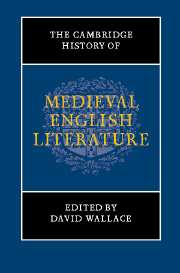Book contents
- Frontmatter
- I AFTER THE NORMAN CONQUEST
- II WRITING IN THE BRITISH ISLES
- III INSTITUTIONAL PRODUCTION
- IV AFTER THE BLACK DEATH
- V BEFORE THE REFORMATION
- Introduction
- 24 Hoccleve, Lydgate and the Lancastrian court
- 25 Lollardy
- 26 Romance after 1400
- 27 William Caxton
- 28 English drama: from ungodly ludi to sacred play
- 29 The allegorical theatre: moralities, interludes, and Protestant drama
- 30 The experience of exclusion: literature and politics in the reigns of Henry VII and Henry VIII
- 31 Reformed literature and literature reformed
- Chronological outline of historical events and texts in Britain, 1050–1550
- Bibliography
- Index of manuscripts
- Index
- References
31 - Reformed literature and literature reformed
from V - BEFORE THE REFORMATION
Published online by Cambridge University Press: 28 March 2008
- Frontmatter
- I AFTER THE NORMAN CONQUEST
- II WRITING IN THE BRITISH ISLES
- III INSTITUTIONAL PRODUCTION
- IV AFTER THE BLACK DEATH
- V BEFORE THE REFORMATION
- Introduction
- 24 Hoccleve, Lydgate and the Lancastrian court
- 25 Lollardy
- 26 Romance after 1400
- 27 William Caxton
- 28 English drama: from ungodly ludi to sacred play
- 29 The allegorical theatre: moralities, interludes, and Protestant drama
- 30 The experience of exclusion: literature and politics in the reigns of Henry VII and Henry VIII
- 31 Reformed literature and literature reformed
- Chronological outline of historical events and texts in Britain, 1050–1550
- Bibliography
- Index of manuscripts
- Index
- References
Summary
Within forty years of the death of Henry VIII in 1547, Sir Philip Sidney looked back on Chaucer as a poet lost in ‘mistie time’. Surveying English literature, Sidney celebrated Chaucer for his ‘reuerent antiquity’ but – unlike Wyatt two generations earlier – treated him as a writer of the past. Modern writing for Sidney begins with the Mirrour of Magistrates of 1555, and his summary of authors obliterates everything after Chaucer, even Lydgate’s Fall of Princes, the Mirrour’s inspiration. English literary history has been strongly influenced by this sense of a division from the past, which continues to this day to divorce the study of Chaucer from Shakespeare, the ‘medieval’ from the ‘modern’ (or at least ‘early modern’). The schism is none the less seldom and reluctantly accounted for. In a classic study, C. S. Lewis at once recognized Elizabethan literature as a ‘new culture’ and then categorically rejected all received explanations for this new spirit of the age, whether ‘Humanism’ or the ‘Renaissance’, Copernican astronomy or New World geography.
Historians in other disciplines – not only political or social but artistic or musical – might consider that this aetiology resolutely misses the most material change of all: the Reformation. Debate about the meaning and consequences of this event (whether it is an event at all) has preoccupied English historical writing for centuries. Yet by this fierce controversy literary history remains largely unmoved. The Reformation is a watershed in English history, but in the history of English literature is no more than a backwater, a stagnant and brackish one at that.
- Type
- Chapter
- Information
- The Cambridge History of Medieval English Literature , pp. 821 - 851Publisher: Cambridge University PressPrint publication year: 1999
References
- 2
- Cited by



